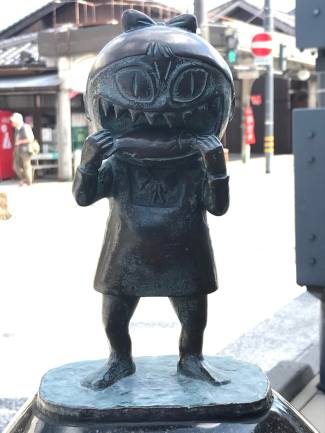This past October, a new holiday popped up to celebrate the new Japanese emperor’s coronation. October 21 was designated as the original date that the emperor was supposed to do his parade through the streets of Tokyo. It was later postponed because of typhoon Hagibis. Some friends and I took that opportunity to travel–as did many people all over Japan.
We went the Japanese tour package route and got a deal through JTB, Japan Travel Bureau. The deal was for three a three-day tour that included hotel, airfare, some meals, and entrance fees. Of course, it came with the requisite tour bus and guide. The tour itself cost ¥57,000. Everything else was on us.
Our tour left Hokkaido on Sunday, October 20 and got us back on Tuesday, October 22th.
If you haven’t taken a Japanese tour, it’s quite an experience. These tours usually pack a lot of sights and activities into a short time span–and it goes pretty smoothly. I’m amazed we got to see a lot, considering the short time we were in the area.
Tottori

So the first thing you think of when you say Tottori is the famous sand dunes. This is quite unique to the area as it’s the only place in Japan that has such desert sand conditions. The sand in Hokkaido is pebbly and very rough. In Tottori, the sand was very fine, which made it perfect to use for art. We had a couple of hours at the site so there was time to go see the sand dunes and also walk through some amazing art sculptures at the sand museum:

The theme for the year was Travel Through South East Asia.



After that, we visited a little known temple that is famous in the area: Hakuto Shrine.

This shrine is linked to the White Rabbit Inaba and is related to one of Japan’s creation myths. Because this myth involves one of the first stories of a legendary couple who falls in love, you come here to pray for good, romantic relationships.

From there, we traveled to our hotel, which was close to Daisen, a famous mountain in the San-in area that looks like a perfect cone. It is an onsen town, so our hotel had a very nice rotenburo, which is the outdoor bath. The spring itself is full of minerals, but it was way too hot.
Shimane
The next day, we left Tottori and traveled to Shimane. Our first stop was the Adachi Museum, which has an outdoor Japanese garden that is ranked at the top for it’s design and beauty. The artwork inside the museum was amazing, of course, but the main draw was that garden. It. Was. Spectacular.




There was so much to take in, I wish we had more time to spend there–but what can you do when you’re on a tour, right? I definitely want to go back again and this time, spend a full day at the museum and the surrounding area.
The next stop on the tour was Izumo Taisha, a very famous shrine in the area. I don’t remember much about this shrine, except that enmusubu is an important part of this shrine. Musubu means bind in Japanese, so this is where you also come to pray for good relationships. 

Next stop was Matsue City. We had the option to go to the castle or take a river boat cruise. I went with older people who had trouble walking so we opted to take the cruise instead. The tour guide explained that the path getting to the castle was long and would take quite a long hike to go through the castle itself and the grounds. Since my friend didn’t want to do it, we decided to take the more leisurely cruise instead.

The bridges in the city are built quite low, so the boat we were in had a retractable roof that would go down so we could pass through.

Every time we had to duck, the captain of the boat warned us before doing so.


We didn’t have time to go through the Lafcardio Hearn Museum, but if you’re interested in him and his life, there is an excellent museum dedicated to him in Matsue City.

After the river boat, we spent most of our time at the Samurai residence, or the area that was available to the public.

After that, we headed to our hotel for the evening and enjoyed some really delicious local Shimane food. The next day, we went to another Japanese garden which was famous for it’s botan, or peony, and ginseng.


After that, we we went to Shigeru Mizuki Road. Mizuki Shigeru is famous for illustrating the Gegege no Kitaro cartoon and this was his hometown. There is a Main Street that features restaurants and shops that have a Kitaro theme. The best part of the area was the little statues of different yokai or monsters that lined the streets. There were about 200 of them, but I only knew just a few.


Kitaro and Medama no Oyaji on the left and Neko Musume on the right.


After that, we had lunch at the port town where there was lots of time for souvenir shopping. This was the last stop before we headed for the airport (above).
While it was fun to spend time with friends on this trip and I got to see a lot of things on such a short time, I think I would rather spend more a more leisurely time in Shimane and Tottori the next time I go.